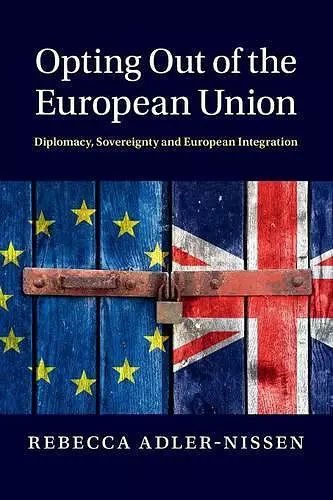Opting Out of the European Union
Diplomacy, Sovereignty and European Integration
Format:Paperback
Publisher:Cambridge University Press
Published:12th Feb '15
Currently unavailable, and unfortunately no date known when it will be back
This paperback is available in another edition too:
- Hardback£94.00(9781107043213)

This book provides the first in-depth account of how European Union opt-outs and differentiated integration work in practice.
It is usually assumed that states opt out of the European Union to preserve sovereignty, but this book demonstrates that national opt-outs may reinforce the integration process. Providing the first in-depth account of how opt-outs work, it will appeal to students and scholars of European politics, international relations and diplomatic studies.European integration continues to deepen despite major crises and attempts to take back sovereignty. A growing number of member states are reacting to a more constraining EU by negotiating opt-outs. This book provides the first in-depth account of how opt-outs work in practice. It examines the most controversial cases of differentiated integration: the British and Danish opt-outs from Economic and Monetary Union and European policies on borders, asylum, migration, internal security and justice. Drawing on over one hundred interviews with national representatives and EU officials, the author demonstrates how representatives manage the stigma of opting out, allowing them to influence even politically sensitive areas covered by their opt-outs. Developing a practice approach to European integration, the book shows how everyday negotiations transform national interests into European ideals. It is usually assumed that states opt out to preserve sovereignty, but Adler-Nissen argues that national opt-outs may actually reinforce the integration process.
'This is an excellent book which covers an important and timely topic in an innovative and useful way. I have no doubt that this will be a work of great interest to students of European studies, international theory, and diplomatic studies. It demonstrates the value of incorporating sociological approaches into the study of the increasingly wider and more important spaces which are developing between the insides and the outsides and about which much of IR theory struggles to speak coherently.' Paul Sharp, University of Minnesota, Duluth
'This is a very exciting book. The argument is original and likely to make a splash among both international relations and European Union scholars. It is one of the first and, to this date, the most sophisticated attempt at showing that sovereignty is not only an abstract concept but something that is lived and managed by real social actors, namely diplomats. The author weaves a rich and varied theoretical literature in an elegant, compelling manner. The empirical material is fascinating and the manuscript is well structured and well written. Thanks to an impressive number of in-depth interviews and unique ethnographical work, the book shows how diplomats embody the state and make sense of formal rules in their routine, daily activities.' Frédéric Merand, University of Montreal
'Adler-Nissen's book stands out for its grounding in political sociology and its admirable demonstration of what the 'practice turn' in IR can contribute to the field. The book also very helpfully includes several appendices on methodology, which will no doubt be of great use to other researchers and students who want to emulate Adler-Nissen's practice approach.' Ayse Zarakol, Global Affairs
'EU 'opt-outs', special exemptions from EU policies, are likely to be in the news in the coming years as the British seek to renegotiate the terms of their membership in the union. This book examines what actually happens when a government secures an opt-out, as Denmark, Ireland, Sweden, the United Kingdom, and others have done on issues such as social policy, border controls, the euro, defense, and asylum and immigration … On the surface, the EU might seem to be a legalistic body, but, as this book demonstrates, its true decision-making and enforcement processes are based on unwritten norms.' Andrew Moravcsik, Foreign Affairs
'I enjoyed this book very much. In it, Rebecca Adler-Nissen argues that opt-outs from European integration, as epitomized by the Danes and the British, are not as straightforwardly harmful to either European integration or to the member states involved as much of the extant literature has tended to claim. She rightly argues that existing approaches to European integration tend to struggle to deal with the existence of differentiation (most notably in the form of opt-outs) and sets out to provide readers with a theoretical alternative more capable of explaining this phenomenon.' Anand Menon, International Affairs
'Rebecca Adler-Nissen's book makes for fascinating and counter-intuitive reading … this is a serious, scholarly book and not an exercise in instant analysis. Adler-Nissen spent years doing multiple rounds of in-depth interviews with large numbers of diplomats to support her argument. Along the way, she has done a great service by underscoring that European integration is sociological, as well as political, legal and economic, in character.' Pierre Hassner, Survival: Global Politic and Strategy
- Winner of Susan Strange Book Prize, British International Studies Association 2015
- Joint winner of IPS Book Award, International Political Sociology Section, International Studies Association 2015
ISBN: 9781107618343
Dimensions: 229mm x 152mm x 15mm
Weight: 390g
266 pages